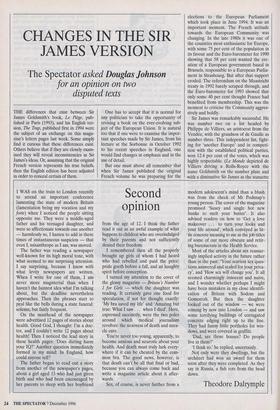Second opinion
I WAS on the train to London recently to attend an important conference lamenting the state of modern Britain (lamentation being my vocation and my forte) when I noticed the people sitting opposite me. They were a middle-aged father and his teenaged daughter, and were so affectionate towards one another — harmlessly so, I hasten to add in these times of instantaneous suspicion — that even I, misanthrope as I am, was moved.
The father was reading a newspaper well-known for its high moral tone, with what seemed to me surprising attention. I say surprising, because I know with what levity newspapers are written. When I write for one of them, I am never more magisterial than when I haven't the faintest idea what I'm talking about, but the deadline nevertheless approaches. Then the phrases start to peal like the bells during a state funeral: solemn, but fairly frequent.
On the masthead of the newspaper were advertised 12 pages of stories about health. Good God, I thought: I'm a doc- tor, and I couldn't write 12 pages about health! Then I noticed the lead story in these health pages: 'Does dieting harm your IQ?' Another question immediately formed in my mind: In England, how could anyone tell?
The father began to read out a story from another of the newspaper's pages, about a girl aged 13 who had just given birth and who had been encouraged by her parents to sleep with her boyfriend from the age of 12. I think the father read it out as an awful example of what happens to children who are overindulged by their parents and not sufficiently denied their freedom.
I remembered then all the properly brought up girls of whom I had heard who had rebelled and paid the price: pride goeth before a fall, and an haughty spirit before conception.
I turned my attention to the cover of the glossy magazine — Britain's Number 1 for Girls — which the daughter was reading. It certainly gave one food for speculation, if not for thought exactly: 'My bra saved my life' and 'Amazing but true: What I saw. . . when I died'. Here, expressed succinctly, were the two poles around which medical journalism revolves: the nearness of death and mira- cle cure.
You're never too young, apparently, to become anxious and neurotic about your health. And death must truly lurk every- where if it can be cheated by the com- mon bra. The good news, however, is that death can't be all that final or bad, because you can always come back and write a magazine article about it after- wards.
Sex, of course, is never further from a modern adolescent's mind than a blush was from the cheek of Mr Podsnap's young person. The cover of the magazine promised 'Saucy and single hot new hunks to melt your butter'. It also advised readers on how to 'Get a love makeover . . . to turn your looks and your life around', which conveyed as lit- tle concrete meaning to me as the job titles of some of our more obscure and retir- ing bureaucrats in the Health Service.
Most of the articles about sex reassur- ingly implied activity in the future rather than in the past: 'Your scariest sex ques- tions answered and sealed for your priva- cy', and 'How sex will change you'. It all seemed charmingly innocent and naive, and I wonder whether perhaps I might have been mistaken in my close identifi- cation of Britain with Sodom and Gomorrah. But then the daughter looked out of the window — we were coming by now into London — and saw some terrifying buildings of corrugated concrete edging right up to the line. They had funny little portholes for win- dows, and were covered in graffiti.
'Dad, are those houses? Do people live in them?'
'I think so,' he replied, uncertainly.
Not only were they dwellings, but the architect had won an award for them soon after they were completed. As they say in Russia, a fish rots from the head down.
Theodore Dalrymple


















































































 Previous page
Previous page